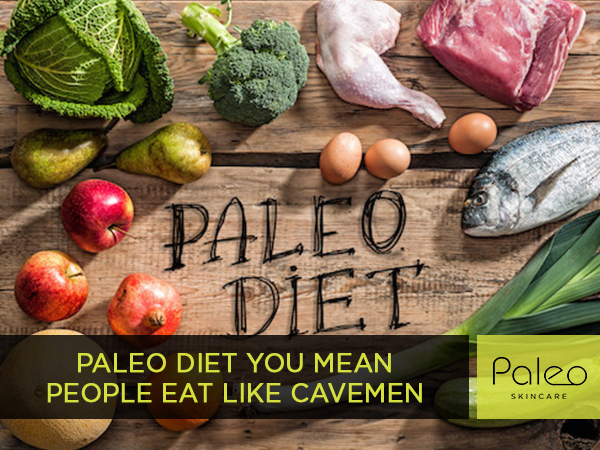Paleo Diet: You mean people eat like cavemen?
Author: Paleo Skincare

What is this Paleo diet, anyway?
If you pay much attention to dieting trends or the latest healthy eating hype, you’ve probably heard of the Paleo diet, and it isn’t really a diet. As you read on you will come to understand it is much more about lifestyle and it seems to be the next big thing, and tons of athletes, celebrities, dieticians, personal trainers, and nutritionists are jumping on board. If you’ve brushed it off as just a fad, you might want to go back and learn more.
The Paleo Diet can offer you some major nutritional benefits and a happier, healthier lifestyle.
Paleolith-what?
The term ‘Paleo Diet’ is actually shorthand for the term ‘Paleolithic Diet’. It’s also been called the ‘cave man diet’ and the ‘stone age’ diet. The Paleo Diet is based on the belief that the typical modern diet of Homo sapiens includes an insane amount of grains, dairy, and processed foods. These are foods that the human body has not evolved enough to digest effectively, and that following the pathway to better health requires eliminating all of these items from our plate.
It makes sense in lots of ways. Our ‘cave man’ ancestors were muscular, fit, athletic, versatile, generally healthy, and well adapted to their hunter-gatherer lifestyles. It’s true that exercise was built into their daily routine because it was essential for survival, but they were also eating pure, unprocessed, wholesome foods. Foods like fresh and seasonal fruits and vegetables, nuts, fish, and grass-fed, and anti-biotic and steroid free meat.
Compare that to diet of the average ‘modern’ adult, who is overweight, typically lethargic, and likely to eventually die from an entirely preventable cause or disease. It is true that these ‘cavemen’ had much shorter life expectancies than modern humans do, but they also lived much more dangerous (primitive) lives and lacked the medical knowledge that we now have access to today.
This “common sense” comparison leads supporters of the Paleo diet to an obvious conclusion: getting back to the basics when it comes to nutrition is the key to a better body, inside and out.
Followers of the Paleolithic lifestyle believe that agriculture is largely to blame for the current state of the world’s health. This way of farming and cultivating foods (grains) has been around for only a tiny fraction of our existence which means our bodies have not adapted to digesting and/or getting the necessary nutrients. Common agricultural staples such as gluten, wheat, and legumes (including soybeans, peanuts, black beans, lentils, and corn) are harder and foreign for our bodies to digest.
Because our bodies have not evolved to break down foods that cannot be hunted or gathered, many of us are allergic to these substances or gain substantial amounts of extra weight from eating them daily because they can cause digestive problems.
If this is true, then it seems like a reasonable assumption that striving to eat a diet that is as close as possible to that which our ancestors enjoyed will lead to better health, longer lives, and less prevalence of chronic diseases, like cancer, type 2 diabetes, and heart disease.
Furthermore, many religious Paleo eaters believe that they should be caring for their bodies as wholesomely as possible. Perhaps if God (source/universe etc) had intended for us to be ingesting the added pesticides, steroids, growth hormones, and antibiotics easily found in most modern foods, then he would have included them in these foods to begin with.
